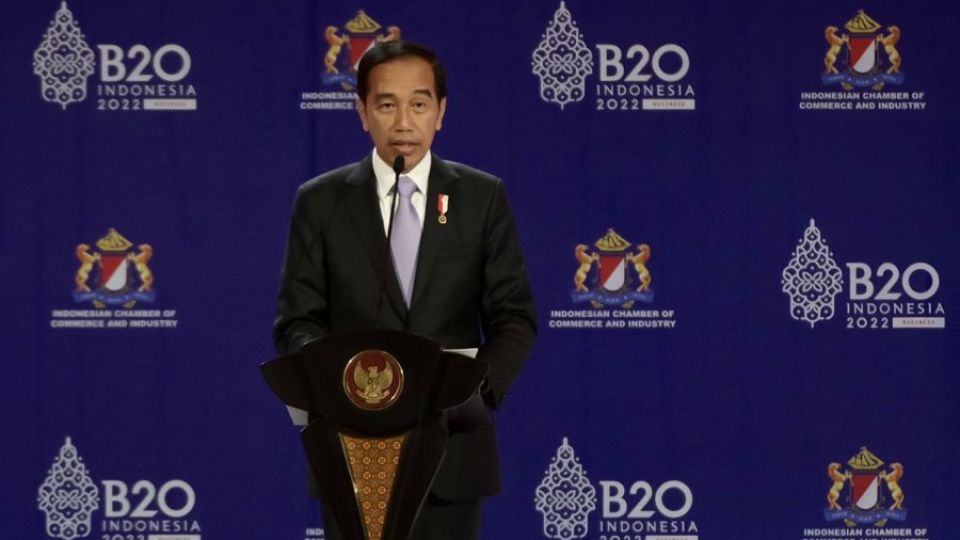January 6, 2023
JAKARTA – While President Joko “Jokowi” Widodo had to endure several challenges to his administration in 2022, a recent survey found that the President closed the year with a 71.3 percent approval rating, his highest since August, buoyed by the public’s positive perception of Indonesia’s hosting of the Group of 20 Summit.
Heads of states from 19 of the world’s largest economies, plus the European Union, gathered in Bali for the November summit in a year marked by rising geopolitical tensions.
“This is unique, because these events are considered for the elite and typically aren’t within the public’s consciousness,” said pollster Indikator Politik Indonesia executive director Burhanuddin Mutadi. But due to massive publicity for the event by the government, the public’s awareness of the issue rose from just 30 percent in June to 52 percent in December.
The survey, conducted from Dec. 1-6, 2022, with 1,200 respondents and released on Wednesday, showed that the public viewed the summit as a “win” for Indonesia, with 89.2 percent of respondents that were aware of the event believing that Indonesia’s success in hosting the summit would strengthen the country’s profile among the global community.
The positive response to the G20 Summit led to Jokowi receiving a 5 percent bump in his approval ratings, up from 66.2 percent in November.
Despite various challenges in 2022, including public dissatisfaction over soaring cooking oil prices that led to his rating hitting a six-year low of 58.1 percent in May, the police murder scandal in August and the Kanjuruhan soccer stadium disaster that killed over 100 people in October, the public has generally approved of Jokowi’s administration.
Burhanuddin chalked this up to the public’s perception of the state of Indonesia’s economy, which has shown a positive trend since the beginning of the pandemic. “From our surveys, even looking as far back as 1999, of all the variables that affect a president’s approval ratings, the economy [is the most important],” said Burhanuddin.
Economic policies
While public dissatisfaction over the economy momentarily rose in May and September, due to the soaring cooking oil prices and the subsidized fuel price hike respectively, the public has generally been optimistic on the state of the country’s economy.
In the survey only 29.3 percent expressed dissatisfaction over the economy, down from 36.2 percent in September right after the fuel price hike. This has translated into the President’s approval ratings, which have never dipped below 50 percent and have generally stayed well above the 60 percent mark throughout the year.
Hasto Kristiyanto, the secretary-general of the ruling Indonesian Democratic Party of Struggle (PDI-P), of which Jokowi is a member, said that this justified the focus of Jokowi’s administration on allocating funds to programs that directly affect the poor. “While the G20 got a warm reception, this survey shows that the economy should still be the main focus of the government right now,” said Hasto.
Of all respondents who approved of the President, 41 percent picked the government’s social aid program as the main reason behind their support. Aside from functioning as a measure of the government’s performance, the survey also found that the President’s approval rating could have an impact on the 2024 election.
Central Java Governor Ganjar Pranowo, also a PDI-P politician, has seen his prospects increase alongside the President’s approval rating. Ganjar’s current electability rating stands at 35.8 percent, up from 33.9 percent in November.
Conversely, former Jakarta governor Anies Baswedan, perceived by some as the figurehead of the opposition, has experienced a decline in his electability in the same period. While a November survey pegged him within striking distance of Ganjar with a 32.2 percent rating, the latest survey had him at 28.3 percent, just ahead of Gerindra Party chairman and Defense Minister Prabowo Subianto at 26.7 percent.
“One of the things we found in the survey is that Jokowi’s approval rating has an impact on candidates that are associated with, or stand in opposition to, the President,” said Burhanuddin.


